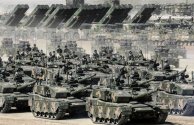Originally on June 6th, Chinese and Indian commanders reached an agreement to disengage in order to avoid further conflict. The protocol of disengagement was already established, yet an Indian officer stirred the pot. Seems like the Indian commander was incapable of maintaining discipline of his frontline officers; India later withdrew their army commander.
What caused this? In the frontline, they have the battalion commander from a company -- their company is equivalent to our division -- their division's chief of staff is different from ours in that he doesn't have any right to command, only right to advise. So when you give the division's chief of staff the right to command a battalion, it's actually a promotion.
So, this colonel who now commands a battalion of five, six hundred. All he wants is to contribute a deed of merit -- take advantage of the night when Chinese are away from the LAC to sleep, cross the border, destroy some Chinese tents, capture some Chinese tents as trophies, and return. When destroying our tents -- he believed there's no one in the tents -- there were two civilian workers there, and a fight broke out. From our four civilian workers stationed there, two ran away to call for help; and so our people went on up there to negotiate and de-escalate. During the exchange, they took first initiative and killed our communications officer.
At this point we have to respond. And, as per agreement, first, we would not use fire arms and such "hot weapons", second, we must not use sharp-edged "cold weapons." So blades and knives are out of the question. So what's left is clubs, sticks, and stone, and such "dull cold weapons." When the fight was over, about 20 of their people died, which was unexpected. We also didn't expect that it would cause around 20 casualties. Our guys just wanted to teach them a lesson, they killed one of ours first after all.
The colonel who stirred the pot was the first among their deaths. I think this colonel is quite brave for being the first on the frontlines, and first to die. Later they say "The Chinese were targeting our officers!" The colonel's lieutenants also died. They also say "The Chinese threw stones at us while we ran down the mountain! We fell into the river." Even in June, the Galwan River is extremely cold. And please note, when you fight at altitude of 4,000 meters, if you get a head injury, you immediately have brain herniation, with symptoms like seizure. If you don't treat it in time, it's over. So, later that night, we ask them to come collect their injured. We allowed them to come over but they didn't dare to, and only came to get their men on the second day. Valuable time was wasted.

